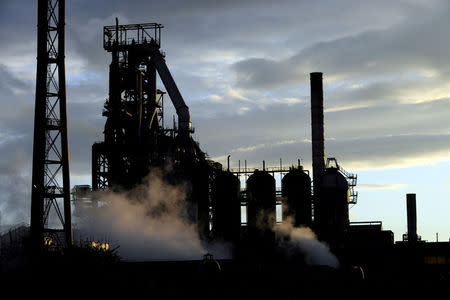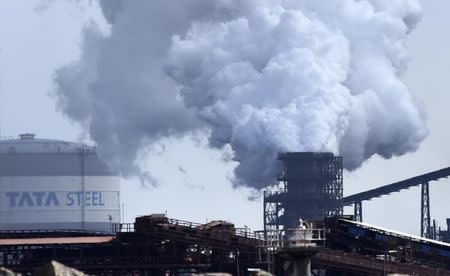Windfall at Tata's Port Talbot unlikely to change long-term outlook
By Maytaal Angel and Barbara Lewis PORT TALBOT, Wales - Port Talbot's loss-making steelworks is enjoying a windfall from a weaker pound, higher steel prices and stringent cost-cutting, but the benefit could be short-lived and not enough to persuade its Indian owners Tata Steel they want to keep it. The fate of the century-old steelworks, Britain's largest, has been up in the air since Tata Steel said in March it planned to divest all of its British assets following last year's losses of up to 1 million pounds a day. Britain's June 23 vote to leave the European Union, which prompted Tata to say it would also consider a joint venture, has only increased the uncertainty. In the steelworks itself, where industrial chimneys belch steam and molten metal glows at temperatures well over 1,000 degrees Fahrenheit, the focus is on day-to-day survival and convincing Tata that Port Talbot steelmaking can be sustainable. Closure "does not even bear thinking about", said production manager David Meecham, who has worked at Port Talbot since 1984. His wife and daughter work in administrative departments and one of his two sons is an electrician at the plant. In a glimmer of hope for the Meechams, a source close to Tata management told Reuters last week the plant has been turning an operating profit of around 10 million pounds a month since the financial year to March 2016, for which it reported pre-tax losses of £599 million. Earnings have been boosted by a weakened pound following the Brexit vote and by a restructuring that axed 750 jobs, mothballed a nearby rolling mill and cut output, said the source, who declined to be named because he is not authorised to speak to the press. Tata Steel spokesman Rob Simpson said he could not confirm any earnings figures beyond those officially released. Steel prices have recovered some 30 percent since touching decade lows last year, meaning margins at the plant have widened as it works its way through stockpiles of raw materials bought before this year's price rally in iron ore <.IO62-CNI=SI> and surge in coking coal. The source said the restructuring plan had put the works on track to be profitable regardless of short-term price movements. "That plan is delivering and everything else in terms of pricing is icing on the cake," the source said. Tata Steel officials speaking publicly have been more cautious, warning of continued volatility and a structural oversupply aggravated by cheap Chinese steel. The Port Talbot works newspaper, Delivering Our Future, congratulates staff on breaking production records but has headlines saying "More to Do" and "We're not out of the Woods". Industry analysts say Tata could be concerned about what will happen when stockpiles run out and it must buy materials with a weaker pound. They also say the company is being tactical as it seeks to negotiate a joint venture with German conglomerate Thyssenkrupp . "Possibly, they don't want it to look as if there's any option other than to divest," said Jason Kaplan, analyst at IHS Markit. The issue of profitability is also delicate as the two companies negotiate how to handle an extremely costly pension scheme Tata inherited when it bought Corus, formerly British Steel, for $12 billion in 2007 -- a burden Thyssenkrupp does not want to take on. Any government rescue plan for the pension could hang on Tata Steel proving that it cannot fund the scheme. BREXIT UNCERTAINTIES After Britain voted to leave the EU, Tata, which had already sold its operations in Scunthorpe, England, for a reported one pound, suspended the sale process for the rest of its UK operations and said it would also look at forming a joint venture. That plan has made politicians and steelworkers in Port Talbot nervous because they fear it increases the likelihood the Welsh plant could be closed altogether rather than sold. Alan Coombs, head of the local Community union and a 34-year veteran of the plant, voted to remain in the EU, believing it offered the best hope for Port Talbot where iron-making, the precursor to steel, has existed since the 13th century. Sitting in Bro's Cafe just outside the steelworks, Coombs said unions wanted "a proper business plan", such as guarantees two blast furnaces would continue to operate at Port Talbot. In particular, unions see a threat from Tata Steel's Dutch plant at IJmuiden, strategically located on mainland Europe with easy access to major markets, including the biggest EU economy Germany. There is little economic logic to maintaining both IJmuiden and Port Talbot and there is no question for shareholders which is the better plant, industry analysts agree. "The difference between the two is chalk and cheese, unless there is a strategic case for wanting steel, ie you want some sort of resource self-sufficiency," said Bernstein analyst Paul Gait. IJmuiden has historically enjoyed bigger spending as its higher profits have been re-invested. When it released results in September, Tata Steel said it was installing new casting equipment at the Dutch plant, which analysts say costs more than 200 million dollars and improves quality and efficiency. The source close to management acknowledged shareholders favour IJmuiden. "Clearly the company (Thyssenkrupp) has consistently said the consolidation that would be necessary for this merger," the source said. "My personal fear is the majority of consolidation would take place in UK. You can't deny the logic from a shareholder point of view, the problem is if you are the one being consolidated." FAITH IN BREXIT Voters in the Neath area surrounding Port Talbot returned one of the most decisive anti-EU votes in the referendum. The source close to management who spoke to Reuters was among them. "I voted to leave on the basis that we need to take control of our own sovereignty," he said. He said he had hoped to maintain unhindered access to the world's biggest trading bloc. But Prime Minister Theresa May's government appears to be leaning towards a "hard Brexit" which emphasises tighter immigration controls over free trade, likely curbing foreign investment needed to fund Britain's huge current account deficit and raising the prospect of punishing tariffs. Welsh First Minister Carwyn Jones, who campaigned to stay in the EU, said a hard Brexit would choke Port Talbot by damaging the much larger manufacturing sector through punishing tariffs on major exports such as cars. Britain's car industry employs some 800,000 people and consumes about a third of the steel made in Port Talbot, which employs nearly 4,000 people directly. "A hard Brexit would be a disaster. There's no getting around that," Jones told Reuters as he called in at Port Talbot's Remus bayside cafe. The owner of Bro's Cafe said she was convinced a post-Brexit Britain will be better for the steelworks, which provides 80-90 percent of her clientele. "You have to have a British steelmaker. The government will offer them money or something and they'll be more free to do that outside the EU," she said. Such optimism flies in the face of stated policy, however. The government's industrial strategy available online says that a post-Brexit Britain is "unlikely to begin subsidising failing industries" given it would remain a member of the World Trade Organization, whose rules restrict the use of subsidies. (Additional reporting by Carolyn Cohn in London and Georgina Prodhan in Frankfurt; Editing by Sonya Hepinstall)

 Yahoo News
Yahoo News 

